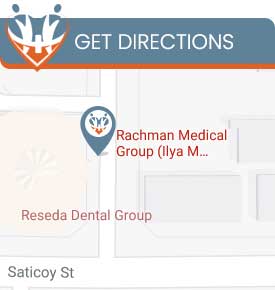Asthma Management Specialist in Reseda, CA
Rachman Medical Group provides specialized asthma management services designed to optimize respiratory health and improve quality of life. Our experienced team utilizes advanced diagnostic tools and personalized treatment plans to effectively manage and control asthma symptoms. Patients can expect comprehensive support, from routine check-ups to emergency interventions, ensuring a proactive approach to asthma care. For more information, contact us today or schedule an appointment online. We are conveniently located at 7601 Canby Ave Suite 7 Reseda, CA 91335.


Table of Contents:
What is asthma?
What are the signs and symptoms associated with asthma?
What are common asthma triggers?
When should I see an asthma management specialist?
How often should I see an asthma management specialist?
At Rachman Medical Group, our experienced healthcare professionals understand the complexities and challenges of managing asthma, a chronic inflammatory disease that affects the airways. It is commonly associated with symptoms such as cough and wheezing as well as chest tightness and shortness of breath.
Our team of doctors and medical staff are well-versed in the diagnosis and management of asthma. We conduct thorough physical examinations, listen to your breathing, and utilize tests such as spirometry to measure lung function. We also use peak flow measurement to assess your breathing capacity, and allergy testing to identify potential triggers that may exacerbate your symptoms.
We understand that each asthma patient is unique, with different triggers and varying degrees of severity. Common triggers can include allergens like pollen or pet dander, irritants like smoke or chemicals, and even physical activities or emotional stress.
Asthma, though incurable, is able to be controlled with medications and lifestyle modifications. That’s why we don’t just offer medical intervention; we also provide health and lifestyle guidance to avoid potential triggers and manage symptoms.
Asthma may lead to a myriad of symptoms, including difficulty breathing, wheezing, coughing, and chest tightness.
Patients may report experiencing common asthma symptoms such as:
• Wheezing, resulting from narrowed airways.
• Coughing, which may occur mainly at night or early in the morning and may disrupt sleep.
• Difficulty breathing or shortness of breath.
• Chest tightness or pain, creating discomfort when breathing deeply.
• Fatigue, stemming from the body’s increased effort to secure the necessary oxygen.
• Rapid heart rate.
More severe asthma cases may exhibit symptoms including:
• Cyanosis, a bluish tint affected the skin, lips, or the nail beds.
• Confusion or disorientation.
• Loss of consciousness.
These symptoms can fluctuate and can over time. While some patients may only experience symptoms in certain situations like during physical activity or exposure to allergens, others may have persistent symptoms.
The persistent inflammation and narrowing of the airways that characterizes asthma can make it difficult to breathe and significantly impact your quality of life. This is why our team is dedicated to helping you identify the various environmental factors that may trigger your asthma attacks and creating a management plan tailored to your specific needs.
Allergens including dust mites or mold spores as well as pet dander and pollen can often trigger asthma attacks. Our team can help you understand how your immune system responds to these allergens and provide strategies to minimize exposure.
Respiratory infections, including the common cold, flu, sinus infections, and pneumonia, are known to exacerbate asthma symptoms.
We also understand that environmental irritants such as smoke, strong odors, and air pollution can trigger asthma. Changes in weather, emotional stress, certain medications, and even food allergies can all potentially trigger an asthma attack. Our team will help you identify potential irritants in your environment and provide advice on how to reduce exposure.
While a primary care physician typically manages this condition, recognizing when to see an asthma management specialist is crucial.
Consider scheduling an appointment with our specialists at Rachman Medical Group if:
• You’re experiencing persistent asthma symptoms: If you frequently suffer from coughing, shortness of breath, chest tightness, or wheezing, especially at night or after exercise, it may indicate that the intervention of our specialists is needed.
• Your asthma is poorly controlled despite medication: If your symptoms persist or worsen despite medication, it’s time to consider seeing our specialists.
• You require frequent emergency care or hospitalizations: If you’ve needed hospitalization or emergency care for an asthma attack, or if you’ve had to use your rescue inhaler more frequently than usual, these are signs of severe asthma that require more intensive treatment and monitoring by our team.
• Your asthma symptoms are interfering with your daily activities: Uncontrolled asthma can significantly impact your ability to work, engage in physical activities, or attend school, necessitating intervention from our specialist team.
• You have co-existing medical conditions: If you have other health conditions that can complicate your asthma, such as heart disease, diabetes, sleep apnea, allergies, sinusitis, or chronic obstructive pulmonary disease (COPD), our specialists can provide a more comprehensive treatment plan that takes these conditions into account.
• You are pregnant or planning to become pregnant: Asthma management during pregnancy requires specialized care to minimize risks for both the mother and baby.
• Your child has asthma and is not responding to standard treatment: Children with asthma may require more specialized care and monitoring by our team to achieve optimal control.
For patients with mild and well-controlled asthma, we recommend an annual visit. During this visit, specialists will assess your symptoms, review your medication regimen, and guide self-management techniques. If your asthma is moderate to severe, or if your symptoms are not well-controlled, more frequent visits may be necessary, typically every 6-12 months. For those living with severe, uncontrolled asthma, we strongly recommend seeing one of our specialists every 3-6 months. For those searching for a doctor in the Reseda, California area, Rachman Medical Group does accept Medicare, and we are excited to get to meet you and provide quality care. We serve patients from Reseda CA, San Fernando CA, Twin Lakes CA, Hidden Hills CA, Burbank CA, and BEYOND!

Additional Services You May Like
▸ Primary Care
▸ Medicare
▸ Diabetes
▸ Hypertension
▸ Medicare Advantage Primary Care
▸ Internal Medicine
▸ Management of Chronic Conditions
▸ Primary Care for Medicare Patients
▸ Type 1 Diabetes
▸ Type 2 Diabetes

Additional Services You May Like
▸ Primary Care
▸ Medicare
▸ Diabetes
▸ Hypertension
▸ Medicare Advantage Primary Care
▸ Internal Medicine
▸ Management of Chronic Conditions
▸ Primary Care for Medicare Patients
▸ Type 1 Diabetes
▸ Type 2 Diabetes





